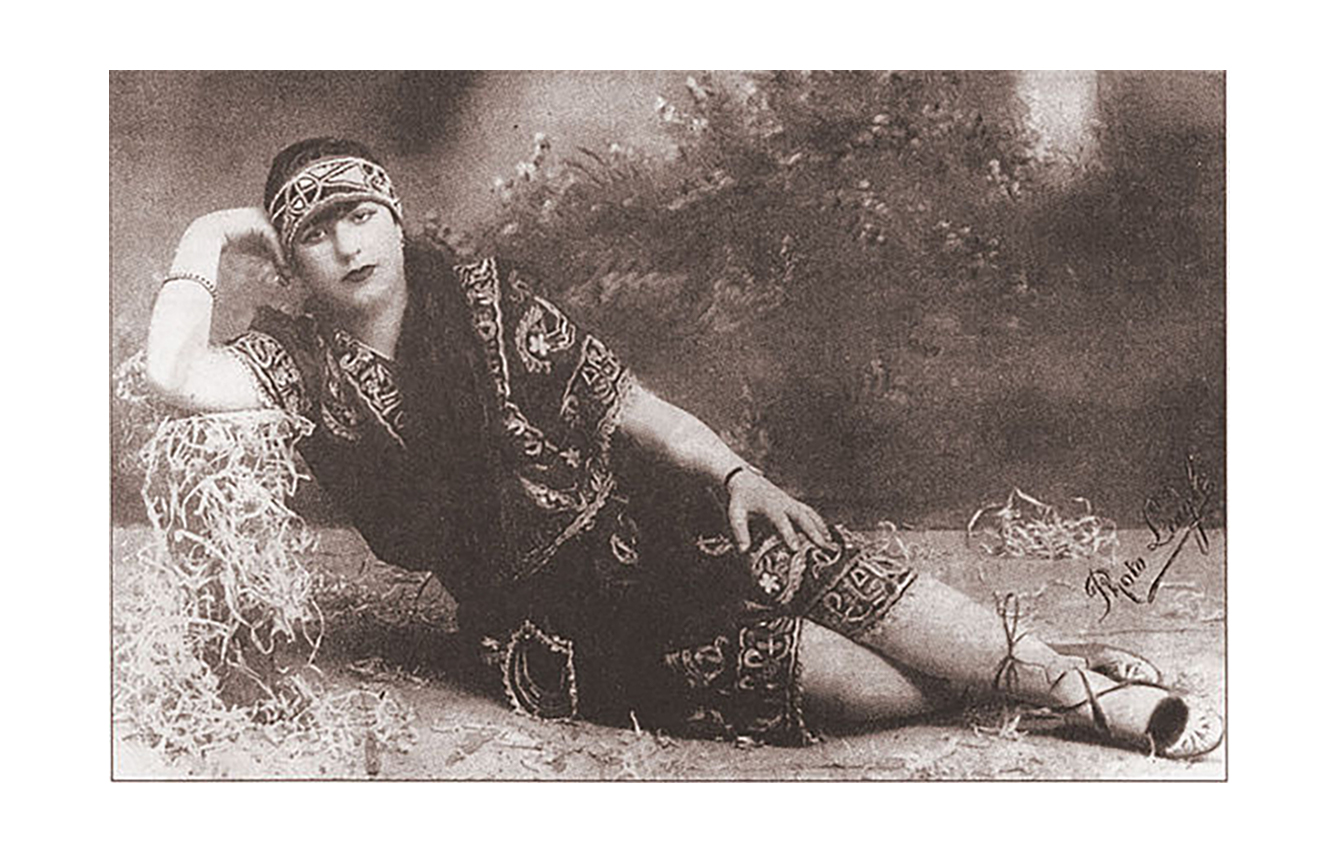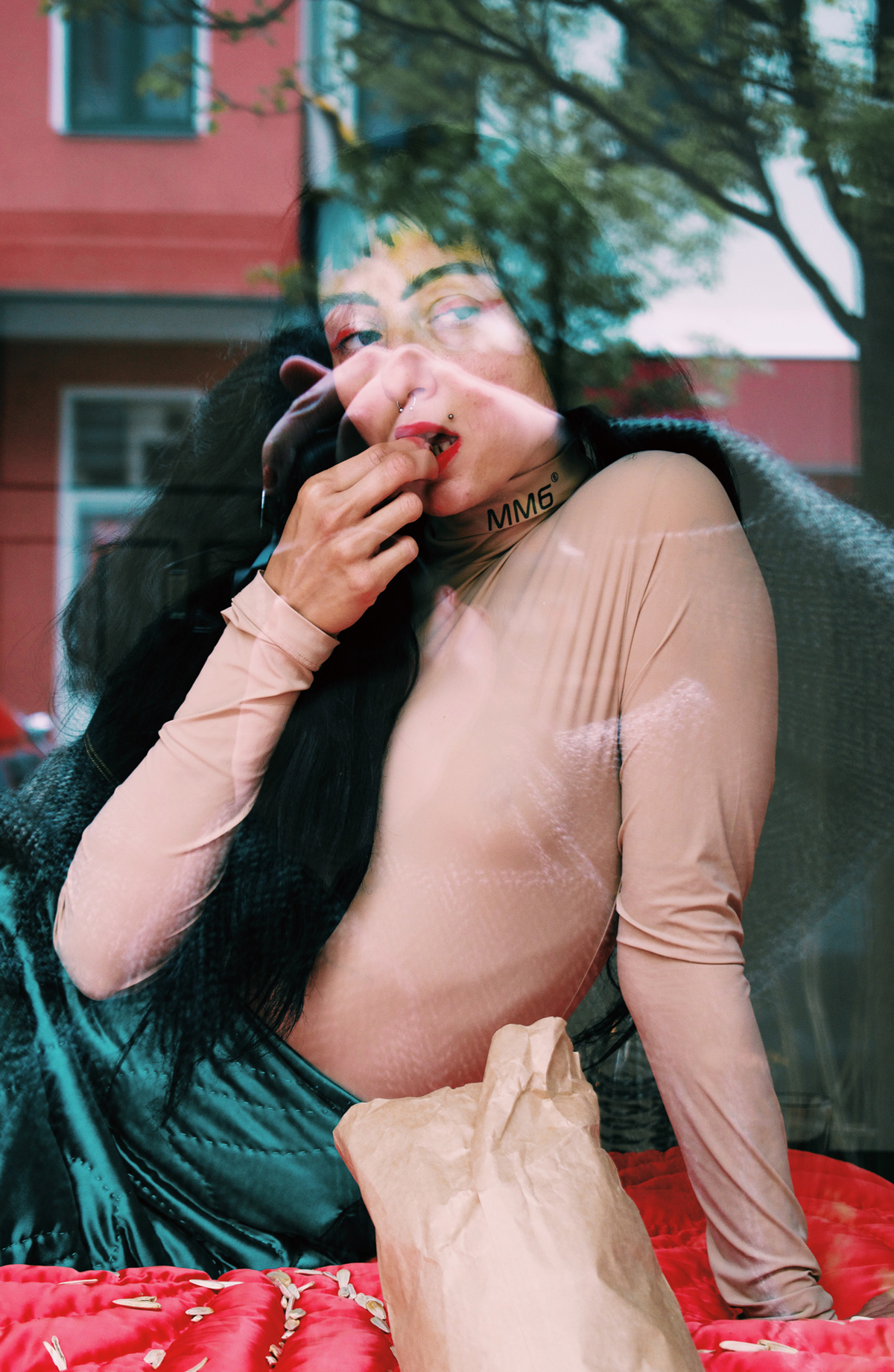- 02 MAY — 27 MAY 2021


I plant my seeds in here
For her* installation and live performance “I plant my seeds in here” Leman Sevda Darıcıoğlu collaborates with Turkey’s Queer icon Jilet Sebahat (Razor Sebahat) to create a critical appreciation of the films “Madame X: An Absolute Ruler” and “Ticket of No Return” by Ulrike Ottinger while exploring an inclusive and intersectional feminist solidarity.

Artist Statement
"I plant my seeds in here" focuses on the topic of mobilization under European border policies and making a new home in a new place as a citizen of the “global south” moving to Europe.
Darıcıoğlu begins to question the immigration conditions of citizens from the “global south”, creating a critique of European immigration policy that goes hand in hand with approaching the baggage of the one's immigrated. Adopting a queer-feminist, punkish stance to break through the victim discourse, the artist first appropriates a “dirty immigrant image” and appeals to some solidarity and inflammatory approaches from Turkey's past and present as the baggage she* carries with her. To this end, she* first turns to Kanto music.

The musical genre of Kanto, which brings together Western instruments with Eastern makams (melodies), has its roots in Istanbul of the late Ottoman period and was a landmark, especially for non-Muslim women. While Muslim women were not allowed to perform and sing for religious reasons, the Kanto singers, the Armenian, Greek, and Roman women, standing against the morals of the time, did not give up making their own choices of their own free will, performing, singing, wearing revealing clothes, having lovers. In "I plant my seeds in here" Darıcıoğlu remembers one of those women, Peruz: the first Kanto singer, Armenian songwriter, and composer who taught many women how to sing and perform and, it can be interpreted, carried solidarity among these marginalized women. While evoking Peruz as one of the feminist artists of her era, Darıcıoğlu appropriates her legacy in a queer-feminist way through the eight-hour live performance and multidisciplinary installation featuring a contemporary Queer icon: Jilet Sebahat (Razor Sebahat), the latest video work titled "So what?".
The video work "So what?" by Istanbul-based Queer performance artist, DJ, and writer Jilet Sebahat is a queer cover version of the song "It's called sex", which is a parodic response to the women's liberation of the 1970s by a Turkish classical music composer, Arif Sami Toker. While it sounds like a celebration of sexuality at the beginning, the lyrics quickly turn into ridicule of women. Jilet Sebahat, taking the song as a moralistic reaction against the liberation movement of the period, creates a response to the contemporary moralistic voice through re-writing its lyrics. In this way, they form a hussy-queer position against the binary gender system and transphobia, which is directed against heteropatriarchy throughout the world.
Through the collaboration between Darıcıoğlu and Sebahat, as well as the union of Peruz's spirit, the women's voice of yore, with current radical queer discourse, "I plant my seeds in here" gains a multiplex discourse that expresses a "stronger together" attitude, manifests solidarity within queer feminism, and queer appropriation of history. Thus, Darıcıoğlu readapts and prepares her* heritage through these appropriations, which can be seen as taking over the "seeds" to generate them.
"I plant my seeds in here" creates a punky, queer, and floozy immigrant image and reverses the victimized perception of the diasporic subject concerning the immigration history between Germany and Turkey.
*
For "I plant my seeds in here" costume stylist Letisya Tapan dresses Leman Sevda Darıcıoğlu in Cult Form. Thanks to Ali Emir Tapan, Cult Form, Hasan Aksaygın, Performistanbul and Oliver Baurhenn for their support.
Leman Sevda Darıcıoğlu (1985, Izmir - lives & works in Berlin - Istanbul) focuses on the investigation/exploration of the physical/emotional boundaries and limitations of the human body. Taking this corporal research as a core, Darıcıoğlu engages with hegemonic political/social concepts and norms in her* artistic practice, ranging from performance art to time- and space-based disciplines such as video, installation, and public interventions. When she* needs to define her*self as an artist, she* chooses to use the term Queer artist. Her* notion of queer refers not only to a realm beyond heterosexuality and binary gender but also to a platform beyond normativity as such.
Between 2012 and 2019, Darıcıoğlu was part of the advisory team for a series of queer theoretical writings called "Queer Düş'ün" [Queer Fantasy /Thought] and was the translator of several queer books in the selection, in Sel Publishing House. She* also edited and compiled a queer theory book called "Queer Temaşa" [Queer Contemplation /Spectacle], which was also published as part of the series, again via Sel Publishing House (2016).
Leman Sevda Darıcıoğlu's performances and artistic works have been shown at performance festivals, museums, and galleries in Turkey, Europe, and Asia, including "unboxing: masculinities*", University of Osnabrueck, Lingen (2021); Haus der Statistik, Berlin (2020); Apartment Project, Berlin (2020); Venice International Performance Art Week, Palazzo Mora, Venice (2020); Future Ritual, Kunstraum, London (2019); Contemporary Istanbul Art Fair (2019); Badischer Kunstverein, Karlsruhe (2019); and 18. Asia Biennale Bangladesh, Shilpakala Academy, Dhaka (2018), Jeonbuk Museum of Arts, Jeonju (2017).
In collaboration with GLADT E.V., Darıcıoğlu co-curated an online festival on the topic of queer heritage titled “Madi Ancestors” with Yener Bayramoğlu (2021) and a Queer art exhibition titled “Dream Pavillion” with Yekhan Pınarlıgil and Murat Alat within “Unexpected Territories” at the 26th Tüyap Istanbul Art Fair, Artist 2016, Istanbul, Turkey.
She* was a member of Istanbul Queer Art Collective between 2014 - 2017.
Since 2017, she* has been represented by the international performance art platform Performistanbul.
*As an artist who disagrees with the binary gender system, Leman Sevda Darıcıoğlu uses "she/her" as a strikethrough with an asterisk in writings and takes "they/them" in verbal language.
Jilet (Razor) Sabahat is an Istanbul-based performance artist, DJ, and writer. Their articles and video performances and Djing during the pandemic appear in magazines and media such as Istanbullife, Callingmag, Pembe Hayat (Pink Life), Cumaertesi (Afterfriday), Dramaqueer. Before the pandemic, they performed at Anahit Sahne, Mecra, the Austrian Culture Center (Istanbul), and in Ankara and Berlin. They have a role in "The "Voice of K", the latest play of a radio theater collective (a feminist podcast series running in Turkey).
In their performances and writing, body politics and anger against the oppression of any form come out in a queer stance.



